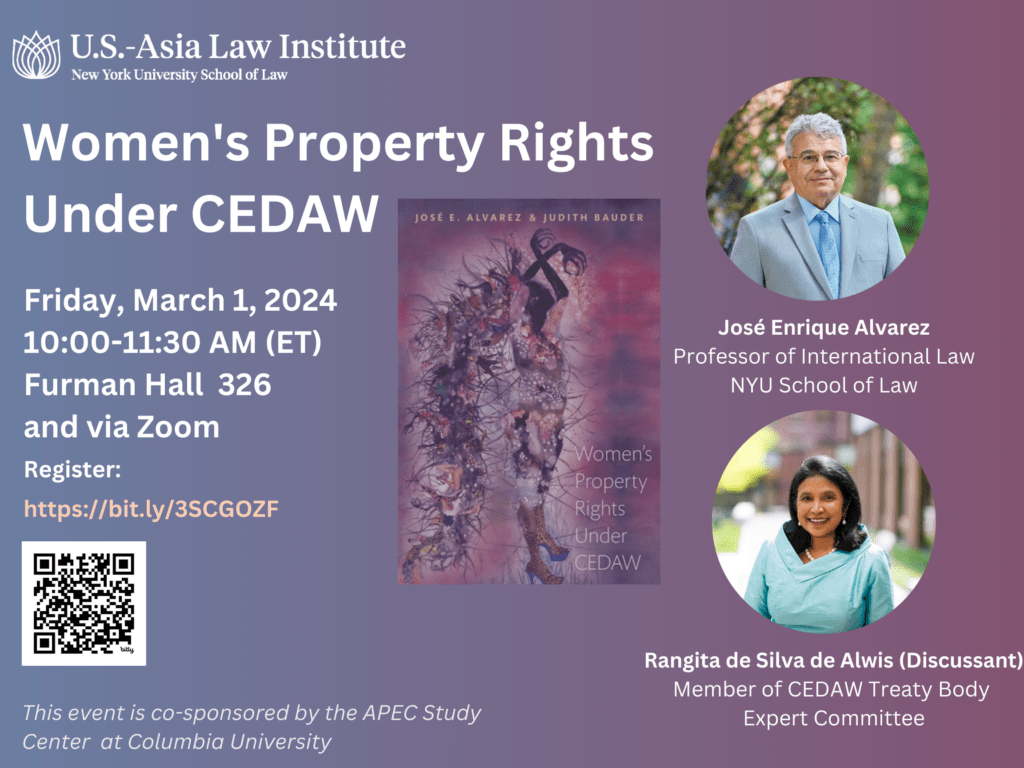As science, technology, and medicine advance, society will confront new ethical dilemmas at the nexus of public health policy and individual choice. The Master of Arts in Bioethics at the College of Global Public Health provides a strong philosophical foundation for navigating these urgent questions.

- This event has passed.
Women’s Property Rights Under CEDAW
March 1 @ 10:00 am - 11:30 am

Women’s Property Rights Under CEDAW
Date: Friday, March 1, 2024
Time: 10:00-11:30 a.m. (Eastern)
Furman Hall 326 and via Zoom
Register

This event is co-sponsored by the APEC Study Center at Columbia University
About the event:
Ensuring women’s property rights has long been seen as essential to ensuring their enjoyment of other human rights, from personal safety to economic development. The expert committee that interprets and seeks to enforce the Convention on the Elimination of All Forms of Discrimination against Women (CEDAW) has over the years developed a unique body of jurisprudence interpreting the convention’s requirement that women enjoy property rights equal to those of men. What is surprising is that this jurisprudence – which encompasses the right to contract, administer property, access credit and government benefits, make use of agricultural land, access adequate housing, and more – has received very little attention from scholars. Law Professor José E. Alvarez, director of the U.S.-Asia Law Institute at NYU Law School, will explain what he calls CEDAW’s “progressive property jurisprudence.”
Click here for a promo code to purchase Professor Alvarez’s new book, Women’s Property Rights Under CEDAW, co-authored with Judith Bauder.
About the speaker:

José E. Alvarez is the Herbert and Rose Rubin Professor of International Law at New York University School of Law and the faculty director of USALI. He is a member of the American Academy of Arts & Sciences, the Institut de Droit International, and the Council on Foreign Relations. He is a former president of the American Society of International Law and previous co-editor-in-chief of the American Journal of International Law. He teaches courses on international law, foreign investment, and international organizations. His more than 140 articles and book chapters and six books have made substantial scholarly contributions to a wide range of subjects within international law, including the law-generating rules of international organizations, the challenges facing international criminal tribunals, the boundaries between “public” and private,” and the legitimacy issues surrounding the international investment regime. His most recent book (with co-author Judith Bauder) is “Women’s Property Rights Under CEDAW” (OUP 2024).
About the discussant:

Rangita de Silva de Alwis is a member of the treaty body to the UN Convention on the Elimination of Discrimination against Women (CEDAW) (2023-2026). At the University of Pennsylvania Carey Law School, where she is associate dean of international affairs, she teaches courses on international women’s rights and the Policy Lab on AI and Bias, Women, Law, and Leadership and directs the Global Institute for Human Rights. She taught Women, Peace and Security at the Harvard Kennedy School of Government (2022-2023) and Globalization and Human Rights at Wharton. She is also a senior fellow at Harvard Law School Center for the Legal Profession and a visiting fellow at Mansfield College, Oxford (Trinity Term). Before coming to Penn Carey Law, she was the inaugural director of the Global Women’s Leadership Initiative and the Women in Public Service Project launched by Secretary Hillary Clinton. In recognition of her global work in advancing women’s rights, she was named the Hillary Rodham Clinton Distinguished Fellow on Gender Equity, Georgetown Institute for Women, Peace and Security. She has published widely in various leading law journals.
